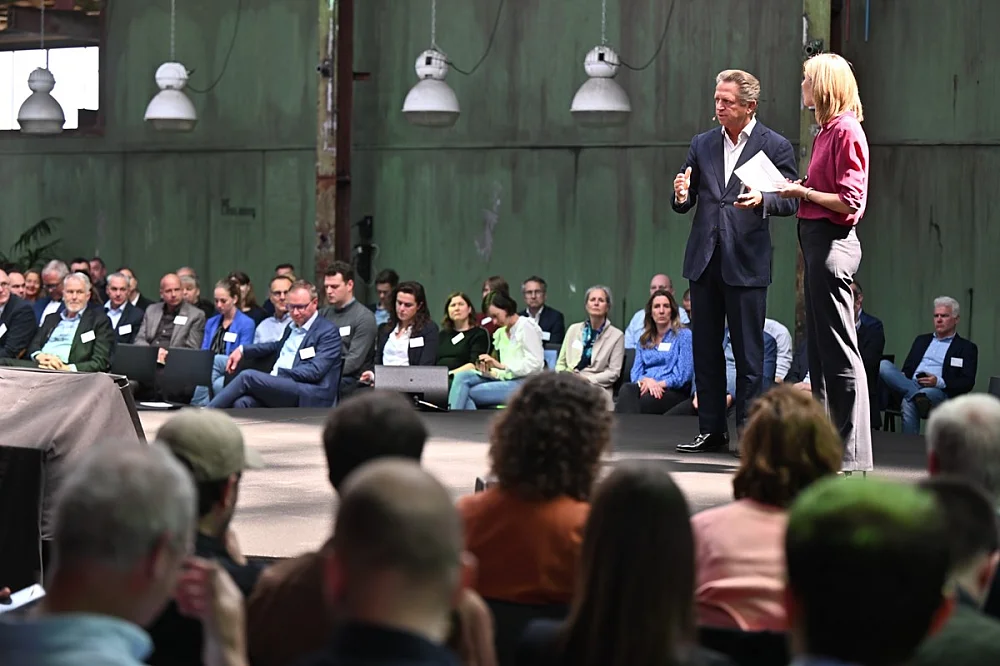First Circular Industry Day Brings the Circular Industry Together in North Sea Port
17-05-2023
On May 16, the first Circular Industry Day took place in Vlissingen, organized by North Sea Port and Smart Delta Resources. For the first time, companies, governments, and knowledge institutions were brought together to collaboratively realize the circular economy in the region. The board of GCNE was also present, among other things, to strengthen the connections further.

Circular entrepreneurship in North Sea Port presents enormous opportunities for all sectors. In the circular economy, waste, by-products, and energy flows become new raw materials. By fostering collaborations between companies and optimizing material flows, a circular ecosystem emerges where raw materials are reused.
The chairs of Smart Delta Resources Netherlands and Flanders, Anton van Beek and Manfred Van Vlierberghe, respectively, stated: “The industries collaborating in Smart Delta Resources are diverse and among the innovative world leaders. They are companies that supply everyone with products we use every day. Industry must produce cleaner. We want to do this here in the port region. We are happy to take a pioneering role and are willing to invest in the essential connection between the circular economy and the energy transition.”
Daan Schalck, CEO of North Sea Port, remarked: “The port company aims to have 150 hectares of clustering space available for circular projects by 2025 and attract at least 10 innovative circular activities with cutting-edge technologies or processes. These activities must complement the seven spearhead sectors from our Strategic Plan to ensure they remain future-oriented: chemicals, steel, construction materials, energy, automotive, food and (animal) feed, and value-added logistics.”
Circular Industry Activities in the Region
Many ports in Europe are committed to attracting circular projects. North Sea Port, however, has an advantage: old processes, such as those using oil and coal, are already being phased out. North Sea Port is gradually transforming towards a circular economy. During the Circular Industry Day, numerous circular activities were showcased. Intensive collaboration is already ongoing. Here are some examples:
Sagro processes surplus streams into new raw materials and products, creating sustainable living environments. Circular demolition has been part of the process for years. With a remarkable reuse rate of 98%, they strive for as much one-to-one reuse as possible. The reusable materials are utilized in the circular construction market or for future projects.
Neste is committed to accelerating the circular economy. Waste and by-product streams are stored and pre-treated before being converted into high-quality renewable raw materials and fuels at refineries. Together with Ravago, Neste plans to build an industrial facility in Vlissingen to convert non-recyclable plastic waste streams into valuable end products.
Enough has established a factory that utilizes bio-refining at Cargill in the production process of sustainable proteins. Thus, they achieve the most sustainable source of food proteins. By employing their food streams circularly, Cargill and Enough contribute to a more sustainable future.
Nearby Dow lies Valuepark Terneuzen. The Valuepark Terneuzen, a joint venture between Dow and North Sea Port, is the ideal location for new initiatives to find a home. The currently available space is intended to be a breeding ground for new chemical processes focused on reusing existing by-products and producing circular carbon.
Dow Terneuzen operates 16 chemical factories, including three world-class crackers that produce raw materials for products we use daily. These crackers have the capability to crack everything: by-products of oil and gas, such as naphtha, as well as waste and biomaterials. Crackers are the largest recycling machines available today, capable of aiding the transition to a circular industry.
To contribute to a climate-neutral port by 2050, North Sea Port and ArcelorMittal are developing the North-C Circular business area together. This will strengthen economic activities around reducing CO2 emissions from ArcelorMittal, the transition from fossil to renewable raw materials, the circular economy, and collaborations with businesses in the region.
Renewi gives new life to used materials every day. Of the 14 million tons of waste they process annually, 89% is recycled or used for energy recovery. In this way, Renewi extracts the raw materials of tomorrow from the waste of today, contributing to a more sustainable society.
For further details with the original text and photos of the event, follow this link.
